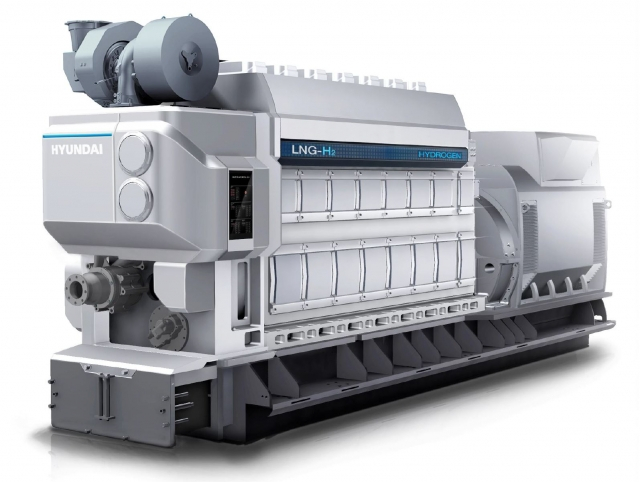Energy
Hyundai Heavy Industries Group develops dual LNG-hydrogen engine
The innovative technology reduces carbon dioxide and methane emissions and can generate power on ships and land
By Dec 23, 2022 (Gmt+09:00)
1
Min read
Most Read
LG Chem to sell water filter business to Glenwood PE for $692 million


Kyobo Life poised to buy Japan’s SBI Group-owned savings bank


KT&G eyes overseas M&A after rejecting activist fund's offer


StockX in merger talks with Naver’s online reseller Kream


Mirae Asset to be named Korea Post’s core real estate fund operator



Hyundai Heavy Industries (HHI) Group has developed South Korea's first hybrid engine that uses liquefied natural gas (LNG) and hydrogen.
The group's holding company, Korea Shipbuilding & Offshore Engineering, and conglomerate affiliate Hyundai Heavy Industries Co. said on Thursday they completed verifying the performance of a 1.5 megawatt-class LNG-hydrogen hybrid engine (HiMSEN) developed with their own technology.
The engine selectively uses diesel fuel, LNG, and fuel mixed with hydrogen to sharply reduce sulfur oxide, nitrogen oxide, carbon dioxide and fine dust emissions, marking the first step in pioneering a hydrogen-powered engine.
In performance tests, the engine met the top-level Tier 3 of nitrogen oxide regulations set by the International Maritime Organization, the group said, performing excellently in reducing carbon dioxide and methane slip, or methane emitted without being completely burned.
If applied to a liquefied hydrogen carrier, the engine is expected to boost the operating effect because the hydrogen boil-off gas generated during transportation can be reused as fuel to minimize the amount of hydrogen lost during a voyage.
At Gastech, the global gas technology exhibition held in September, HHI Group received DNV classification certification for a hydrogen carrier system using a HiMSEN engine.
The conglomerate plans to expand the application of its new hybrid engine to land.
It said the engine has a longer lifespan than those used on land, with outstanding load-following performance that adjusts power generation output in line with changes in electrical load. The engine is expected to be used in small and distributed power generation on land.
"Interest in carbon neutrality is growing in the shipbuilding and marine industries," a group source said.
"We will lead the global market with green technologies that use clean fuel sources such as hydrogen, methanol and ammonia," he added.
The conglomerate plans to develop a fully hydrogen-powered engine by 2025 through ongoing R&D on hybrid engines.
Write to Jae-Fu Kim at hu@hankyung.com
More to Read
-
 Shipping & ShipbuildingHyundai Heavy Industries Group proposes blueprint for sustainable marine utilization solution at 2023 CES
Shipping & ShipbuildingHyundai Heavy Industries Group proposes blueprint for sustainable marine utilization solution at 2023 CESDec 01, 2022 (Gmt+09:00)
1 Min read -
 Carbon neutralityHyundai Heavy to invest $30 million in TerraPower for SMR business
Carbon neutralityHyundai Heavy to invest $30 million in TerraPower for SMR businessNov 04, 2022 (Gmt+09:00)
2 Min read -
 Carbon neutralitySolar cells & modules, Hyundai Heavy’s hidden growth fuel
Carbon neutralitySolar cells & modules, Hyundai Heavy’s hidden growth fuelAug 02, 2022 (Gmt+09:00)
1 Min read
Comment 0
LOG IN


